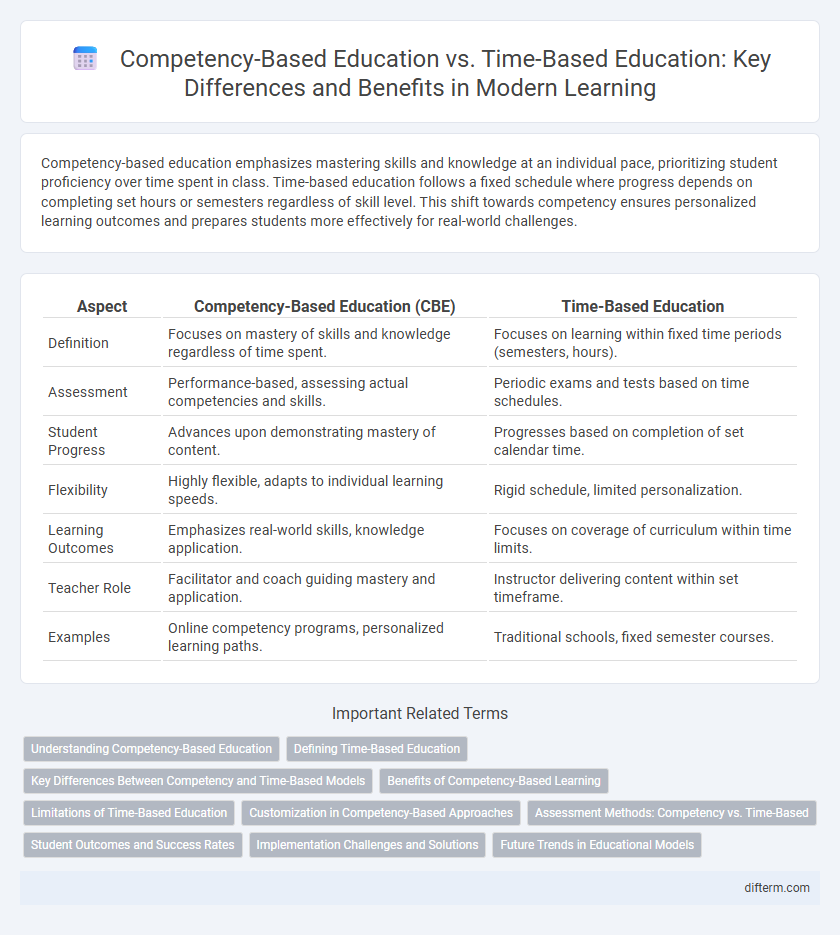Competency-based education emphasizes mastering skills and knowledge at an individual pace, prioritizing student proficiency over time spent in class. Time-based education follows a fixed schedule where progress depends on completing set hours or semesters regardless of skill level. This shift towards competency ensures personalized learning outcomes and prepares students more effectively for real-world challenges.
Table of Comparison
| Aspect | Competency-Based Education (CBE) | Time-Based Education |
|---|---|---|
| Definition | Focuses on mastery of skills and knowledge regardless of time spent. | Focuses on learning within fixed time periods (semesters, hours). |
| Assessment | Performance-based, assessing actual competencies and skills. | Periodic exams and tests based on time schedules. |
| Student Progress | Advances upon demonstrating mastery of content. | Progresses based on completion of set calendar time. |
| Flexibility | Highly flexible, adapts to individual learning speeds. | Rigid schedule, limited personalization. |
| Learning Outcomes | Emphasizes real-world skills, knowledge application. | Focuses on coverage of curriculum within time limits. |
| Teacher Role | Facilitator and coach guiding mastery and application. | Instructor delivering content within set timeframe. |
| Examples | Online competency programs, personalized learning paths. | Traditional schools, fixed semester courses. |
Understanding Competency-Based Education
Competency-based education (CBE) centers on mastering specific skills and knowledge at a personalized pace rather than progressing based on seat time, making it more flexible and learner-focused than traditional time-based education. This approach ensures students demonstrate clear, measurable competencies before advancing, which enhances skill retention and real-world application. By prioritizing outcomes over time spent in class, CBE fosters deeper understanding and prepares learners to meet professional and academic standards effectively.
Defining Time-Based Education
Time-based education structures learning according to fixed schedules and standardized academic calendars, emphasizing seat time over mastery. Students progress through coursework within predetermined periods regardless of individual learning pace or competency acquisition. This model prioritizes uniform exposure to content, often leading to variable skill proficiency and inconsistent student outcomes.
Key Differences Between Competency and Time-Based Models
Competency-based education emphasizes mastery of specific skills and knowledge, allowing students to progress at their own pace, while time-based education follows a fixed schedule requiring students to spend a set amount of time in class regardless of skill acquisition. Competency models prioritize personalized learning paths and assessment of demonstrated abilities, contrasting with time-based models that rely on credit hours and seat time as key metrics. This shift enhances flexibility and ensures learners meet clear, measurable outcomes prior to advancement.
Benefits of Competency-Based Learning
Competency-based learning enhances personalized education by allowing students to progress at their own pace based on mastery of skills rather than seat time. This approach improves student engagement and retention by focusing on demonstrated competencies, ensuring learners acquire practical knowledge applicable in real-world settings. Institutions adopting competency-based models report higher graduation rates and better alignment with workforce demands, driving improved career readiness.
Limitations of Time-Based Education
Time-based education often restricts students to fixed academic schedules, limiting personalized learning paces and failing to address individual skill mastery. This model can result in gaps in understanding as progress is measured by seat time rather than competency. Consequently, learners who require more time to grasp concepts may be unfairly disadvantaged, hindering overall educational effectiveness.
Customization in Competency-Based Approaches
Competency-based education customizes learning by allowing students to progress upon demonstrating mastery, tailoring instruction to individual needs and pacing. Unlike time-based education that adheres to fixed schedules regardless of comprehension, competency-based models provide flexibility and personalized pathways. This customization enhances student engagement and supports diverse learning styles for improved academic outcomes.
Assessment Methods: Competency vs. Time-Based
Competency-based education employs performance assessments that measure students' ability to demonstrate specific skills and knowledge, ensuring mastery before progression. Time-based education relies on traditional assessments accumulated over fixed periods, often emphasizing seat time rather than skill acquisition. This shift toward competency-focused evaluation promotes personalized learning paths and real-world applicability of acquired competencies.
Student Outcomes and Success Rates
Competency-based education (CBE) enhances student outcomes by allowing learners to progress upon mastery of skills, resulting in higher retention and application of knowledge compared to time-based education models. Studies show that CBE graduates exhibit improved job readiness and satisfaction due to personalized pacing and targeted skill development. Time-based education often leads to variable success rates as learning is constrained by fixed schedules rather than demonstrated competencies.
Implementation Challenges and Solutions
Implementing competency-based education (CBE) faces challenges such as aligning assessments with diverse learner competencies and training educators to facilitate personalized learning paths unlike traditional time-based models. Solutions include deploying adaptive learning technologies to accurately measure skill mastery and enhancing professional development programs to equip teachers with necessary CBE methodologies. Overcoming institutional resistance by demonstrating improved student outcomes helps transition from fixed schedules to flexible, mastery-focused education systems.
Future Trends in Educational Models
Competency-based education emphasizes mastery of skills and knowledge at an individual pace, contrasting with time-based education's fixed schedules and seat-time requirements. Future trends highlight a shift towards personalized learning pathways, leveraging technology to assess competencies in real-time and support continuous skill development. This model fosters lifelong learning and adaptability, aligning education with rapidly evolving workforce demands.
competency-based education vs time-based education Infographic

 difterm.com
difterm.com